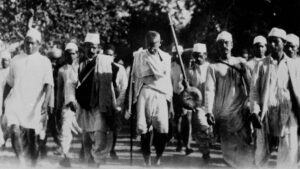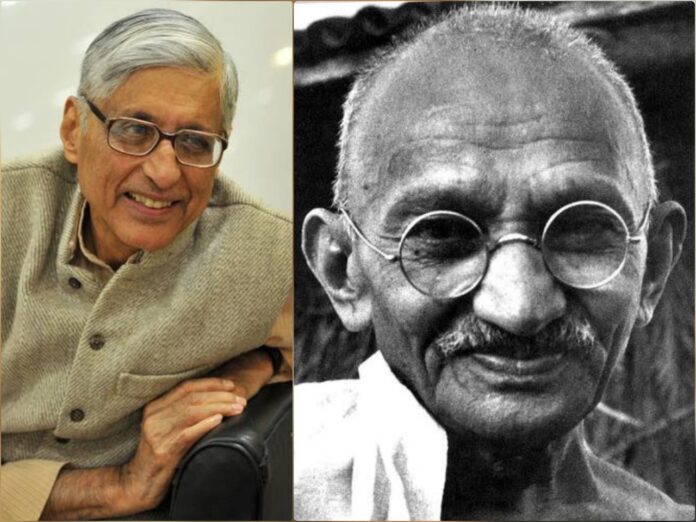Awareness. Because India’s independence was an immediate goal that excited and united all Indians, some of Gandhi’s other goals were forgotten. One of these forgotten goals was public awareness of evils in Indian society.
Three years after his return to India from South Africa, Gandhi wrote a preface to a book of poems by Amritlal Padhiar which described the cruel treatment daily meted out to Gujarat’s “untouchables”. In this 1918 preface, Gandhi asked for the poems to be “read out to men and women in their millions, in the same way, that works like the Bhagavat are read out to them in every square’. (Collected Works 14: 344-5).
All-round education. Zeal for popular education in the widest sense may also be seen in the details of Gandhi’s well-known wish, expressed on the day before he was assassinated, for the Congress to transform itself into a Lok Sevak Sangh. Political independence having been achieved, the national goal now, Gandhi wrote on January 29, 1948, was “social, moral and economic independence” for every citizen, and especially for the villager.
He wanted the contemplated Lok Sevak to educate the people of his or her village “from birth to death”, including “in sanitation and hygiene and in the prevention of illness and disease”. In 1948, Gandhi seemed to be writing for 2020.
The right to vote. Most interestingly, Gandhi specifically asked this Lok Sevak to ensure that “those whose names are missing on the statutory voters’ roll are duly entered therein”. This Lok Sevak must, of course, have “abjured untouchability in any shape or form, in his own person or in his family” and must be a believer “in inter-communal unity and in equal respect and equality of opportunity for all”.
In this note (Collected Works 90: 526-8), Gandhi predicts that “the struggle for the ascendancy of civil over military power is bound to take place in India’s progress towards its democratic goal”. Through this memorandum, Gandhi calls for a grassroots struggle for democratic rights and duties.

Right to speak. Few remember that the Jallianwalla Bagh massacre of April 1919 was the Empire’s response to a nationwide satyagraha called by Gandhi against the Rowlatt Act, which the British had imposed for controlling speeches and writings in India.
Twenty-one years later, in 1940, freedom of speech was once more the right demanded by thousands who joined the Individual Civil Disobedience campaign that Gandhi had launched. Among those imprisoned for a year or more under the ICD campaign (which preceded the more famous Quit India campaign of August 1942) were Nehru, Patel, Abul Kalam Azad, Vinoba Bhave, and Rajaji.
On October 21, 1940, Vinoba, the first ICD satyagrahi, was arrested. Ordered not to report Vinoba’s arrest in his journals, Gandhi suspended their publication! He said:
Let everyone become his own walking newspaper and carry the good news from mouth to mouth… The idea here is of my telling my neighbour what I have authentically heard. This no Government can overtake or suppress. It is the cheapest newspaper yet devised and it defies the wit of Government, however clever it may be.
Also Read: Documentary on centenarian freedom fighter H S Doreswamy to be released on Oct 2
Let these walking newspapers be sure of the news they give. They should not indulge in any idle gossip. They should make sure of the source of information, and they will find that the public gets all the information that they need without opening their morning newspaper… (Harijan, Nov. 3, 1940; CW 73: 126)
Right to dissent. But freedom of speech also meant the right to dissent. While launching Quit India in Mumbai on August 7, 1942, Gandhi declared:
I have read a good deal about the French revolution… Pandit Jawaharlal has told me all about the Russian revolution. But I hold that though theirs was a fight for the people, it was not a fight for real democracy, which I envisaged. My democracy means every man is his own master (CW 76: 381).
Quit India shook the Empire, but it also brought imprisonment and death to fighters for liberty. (Among those who died in detention was Gandhi’s wife Kasturba.) In the summer of 1945, three years after Quit India, most of the jailed were released, and freedom was near.
In February 1946, a mutiny by Indian ratings in ships of the Royal Indian Navy created much excitement in Mumbai, Karachi, and Vizag. No Indian officer joined the ratings in the mutiny, but thousands of workers in Mumbai struck work in support. Agitated mutiny supporters demanded that everyone they came across should shout ‘Jai Hind’.
Commenting from Pune, where he was at the time, Gandhi said: “In as much as a single person is compelled to shout ‘Jai Hind’, or any popular slogan, a nail is driven into the coffin of Swaraj in terms of the dumb millions of India.” (CW 83: 171).
Rajmohan Gandhi has written widely on the Indian independence movement and its leaders, Indo-Pakistan relations, human rights and conflict resolution. He is a biographer and grandson of Mahatma Gandhi and former President of Initiatives of Change International (IofC).



